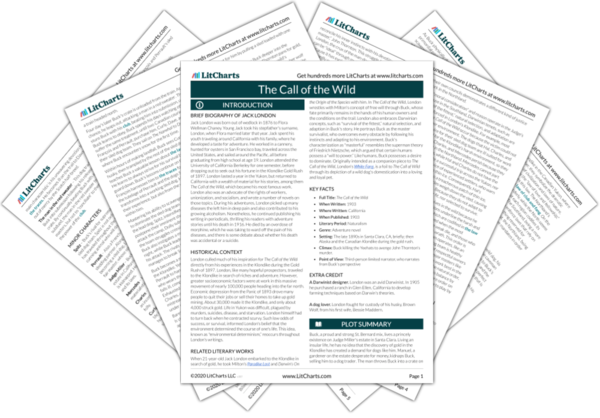The dog eat dog world of the Klondike awakens within Buck a "dominant primordial beast” that drives him to "master, or be mastered.” Buck chooses "to master” by overthrowing Spitz and asserting his rightful place as lead dog on François and Perrault's team. Domination is Buck's aim and he achieves it. Mastery, however, is not just a relentless struggle for power and dominance. London describes Buck's pursuit "to master” as a learning process. Buck "masters,” or comes to dominate his fellow dogs by learning, or mastering, survival skills. He "receives instruction” from the other sled dogs about how to work in the traces and learns "lessons,” like burying himself in the snow to keep warm, or deferring to man's authority when that man wields a heavy club.
The pursuit of mastery is not just limited to the canine world; it's active in the human one, as well. Buck's human owners parallel Buck's drive to dominate through their attempts to tame the wild, both animals and nature, alike. Buck's various owners exert mastery over canines by exchanging these animals like commodities, disciplining them and charting their course across the Klondike. Meanwhile, miners, such as John Thornton, carve through the earth so that they can harvest gold, while pioneers such as Hal, Charles, and Mercedes try to settle the Klondike by imposing their worldly possessions upon it.
Man's will "to master” nature stifles Buck's own innate drive to dominate. While Buck masters other dogs, man masters him. Buck is not able to fully assert his mastery until he flagrantly defies the law of club and fang by attacking the Yeehats. In doing so, Buck willfully overturns man's dominance over dog, but also gains autonomy. Free from man's mastery, he is able to roam nature freely as the leader of a wild wolf pack. Buck has not only mastered the ways of the wild, but his own fate.
The Pursuit of Mastery ThemeTracker

The Pursuit of Mastery Quotes in The Call of the Wild
He was beaten (he knew that); but he was not broken. He saw once for all, that he stood no chance against a man with a club. He learned the lesson, and in all his after life he never forgot it. That club was a revelation. It was his introduction to the reign of primitive law. Again and again, as he looked at each brutal performance, the lesson was driven home to Buck: a man with a club was a lawgiver, a master to be obeyed, though not necessarily conciliated.

Unlock explanations and citation info for this and every other The Call of the Wild quote.
Plus so much more...
Get LitCharts A+Buck had been purposefully placed between Dave and Sol-leks so that he might receive instruction. Apt scholar that he was, they were equally apt teachers, never allowing him to linger long in error, and enforcing their teaching with their sharp teethÉand ere the day was done, so well had he mastered his work.
This first theft marked Buck as fit to survive in the hostile Northland environment. It marked his adaptability, his capacity to adjust himself to changing conditions, the lack of which would have meant swift and terrible death.
The dominant primordial beast was strong in Buck, and under the fierce conditions of the trail it grew and grew.
It was inevitable that the clash for leadership should come. Buck wanted it. He wanted it because it was his nature, because he had been gripped tight by that nameless, incomprehensible pride of the trail and trace—that pride which holds dogs in the toil to the last gasp, which lure them to die joyfully in the harness, and breaks their hearts if they cut out of the harness.
The insidious revolt led by Buck had destroyed the solidarity of the team. It no longer was as one dog leaping in the traces.
Buck stood and looked on, the successful champion, the dominant primordial beast who had made his kill and found it good.
At a bound Buck took up the duties of leadership, and where judgment was required, and quick thinking and quick acting he showed himself superior even of Spitz, of whom Franois had never seen an equal.
He had killed man, the noblest game of all, and he had killed in the face of the law of club and fang.
It was the call, the many-noted call, sounding more luringly and compellingly than ever before. And as never before he was ready to obey. John Thornton was dead. The last tie was broken. Man and the claims of man no longer bound him.











